zAgileConnect API – Link and Unlink Jira Issues from Salesforce – Usage & Examples
Please note that zAgileConnect license is required for a Salesforce user to invoke this API. The methods will throw a zsfjira.ZC.ZCApiLicenceException when executed by a user without a zAgileConnect license
Link a Jira Issue to a Case
Use the following method to create a Link between a Case and an Issue (using Case ID and Issue Key):
zsfjira.ZC.Issues.linkIssue('TP-1',Id.valueOf('5000H00000xLWAd'));Linking an Issue for a different Jira Connection
As in the example above, if the Jira Connection ID is not specified, the Jira marked as 'Default' in zAgileConnect Settings is assumed:

To specify a different Jira other than 'Default', use the Connection ID related to that Jira. You can find the Connection ID in the zAgileConnect Settings:

The Jira Connection ID is a unique identifier to use when calling the zAgileConnect API for specifying a Jira. For example, to link an issue in Jira JccJiraCloud, specify its Jira Connection ID j01 when calling the method:
zsfjira.ZC.Issues.linkIssue('j01', 'TP-1',Id.valueOf('5000H00000xLWAd'));Error Handling
The operation will return an object containing the result of the Link operation including any errors.
zsfjira.ZCBeans.IssueLinkUnlinkResult result = zsfjira.ZC.Issues.linkIssue('TP-1',Id.valueOf('5000H00000xLWAd'));
if(result.hasError()){
System.debug(System.LoggingLevel.ERROR,result.errorMessage);
}License Handling
All operations included in this API require the user to have a valid zAgileConnect license. Try/Catch block below shows how to catch exceptions.
try{
zsfjira.ZCBeans.IssueLinkUnlinkResult result = zsfjira.ZC.Issues.linkIssue('TP-1',Id.valueOf('5000H00000xLWAd'));
}catch(Exception exe){
...
}Posting Errors
You can publish the errors to the Case by invoking the method postErrorMessages
Id caseId = Id.valueOf('5000H00000zdi30');
zsfjira.ZCBeans.IssueLinkUnlinkResult result = zsfjira.ZC.Issues.linkIssue('JP-1',caseId);
zsfjira.ZC.Issues.postErrorMessage(caseId,result);Bulk Operations
Please use the Bulk operations if you want to Link multiple issues. You can not Link multiple issues by iterating through the single Link operations.
Create a set of strings holding the Issue Keys to be linked:
Set<String> issueKeys=new Set<String>();
issueKeys.add('TP-1');
issueKeys.add('TP-6');
issueKeys.add('TP-7');Use the method linkIssues():
List<zsfjira.ZCBeans.IssueLinkUnlinkResult> results = zsfjira.ZC.Issues.linkIssues(issueKeys,Id.valueOf('5000H00000xLWAd'));for linking issues of a different Jira, specify its connection as first parameter:
List<zsfjira.ZCBeans.IssueLinkUnlinkResult> results = zsfjira.ZC.Issues.linkIssues('j01', issueKeys,Id.valueOf('5000H00000xLWAd'));Similar to single Link, the method will return a list of results.
for(zsfjira.ZCBeans.IssueLinkUnlinkResult result:results){
if(result.hasError()){
System.debug(System.LoggingLevel.ERROR,result.errorMessage);
}
}Link Issues via Process Builder
Select the Apex class ‘Link Issue’ and specify a Case ID and Issue Key:
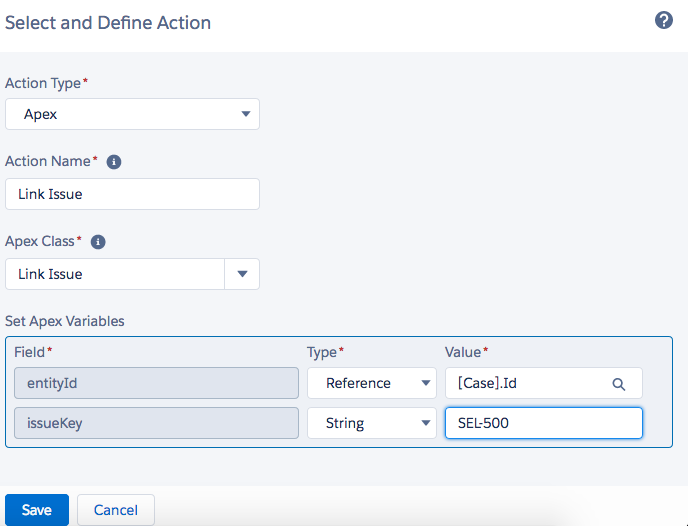
In the Apex action for linking issues you can specify the Jira Connection ID in case you need to link an Issue of a Jira different than the 'Default':
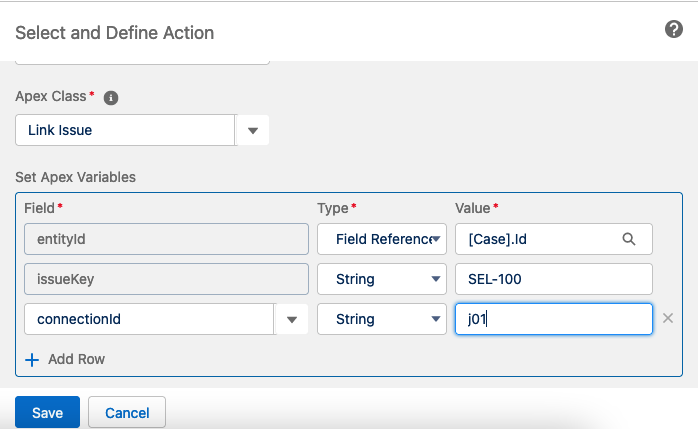
Any errors during the Link operation will be notified through email
Unlink a Jira Issue
To Unlink a Jira Issue from a Case, use the following method with Issue Key and Case ID:
zsfjira.ZC.Issues.unlinkIssue('TP-1',Id.valueOf('5000H00000xLWAd'));for unlinking issues of a different Jira, specify its connection as first parameter:
zsfjira.ZC.Issues.unlinkIssue('j01', 'TP-1',Id.valueOf('5000H00000xLWAd'));Error Handling
The operation will return an object containing the result of the Unlink operation.
zsfjira.ZCBeans.IssueLinkUnlinkResult result = zsfjira.ZC.Issues.unlinkIssue('TP-1',Id.valueOf('5000H00000xLWAd'));
if(result.hasError()){
System.debug(System.LoggingLevel.ERROR,result.errorMessage);
}License Handling
The API requires a valid zAgileConnect license. You can catch the exception, if needed.
try{
zsfjira.ZCBeans.IssueLinkUnlinkResult result = zsfjira.ZC.Issues.unlinkIssue('TP-1',Id.valueOf('5000H00000xLWAd'));
}catch(Exception exe){
...
}Posting Errors
You can post the errors as a result of the operation to the parent entity (Case).
Id caseId = Id.valueOf('5000H00000zdi30');
zsfjira.ZCBeans.IssueLinkUnlinkResult result = zsfjira.ZC.Issues.unlinkIssue('JP-1',caseId);
zsfjira.ZC.Issues.postErrorMessage(caseId,result);Bulk Unlink Operation
Create a set of strings containing the Issue Keys:
Set<String> issueKeys=new Set<String>();
issueKeys.add('TP-1');
issueKeys.add('TP-6');
issueKeys.add('TP-7');Use the method unlinkIssues() with the set of Issue Keys from above and the Case ID:
List<zsfjira.ZCBeans.IssueLinkUnlinkResult> results = zsfjira.ZC.Issues.unlinkIssues(issueKeys,Id.valueOf('5000H00000xLWAd'));for bulk unlinking issues of a different Jira, specify its connection as first parameter:
List<zsfjira.ZCBeans.IssueLinkUnlinkResult> results = zsfjira.ZC.Issues.unlinkIssues('j01', issueKeys,Id.valueOf('5000H00000xLWAd'));The method returns a list of results from the operation:
for(zsfjira.ZCBeans.IssueLinkUnlinkResult result:results){
if(result.hasError()){
System.debug(System.LoggingLevel.ERROR,result.errorMessage);
}
}Unlink Issues via Process Builder
Select the Apex class ‘Unlink Issue’ and specify a Case ID and Issue Key:
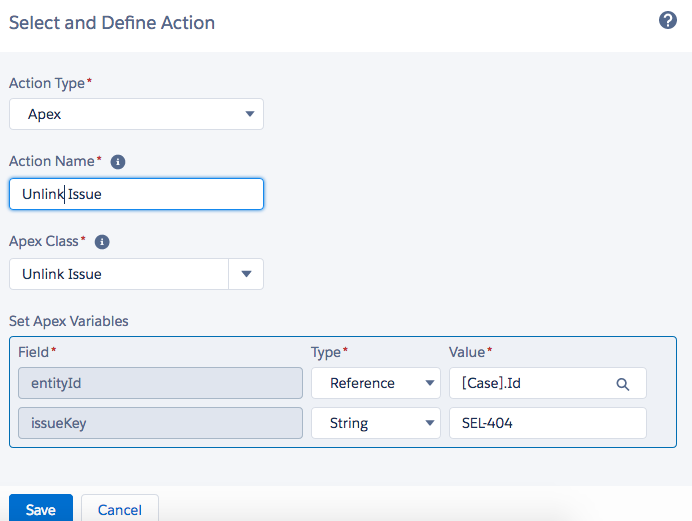
In the Apex action for unlinking issues you can specify the Jira Connection ID in case you need to unlink an Issue of a Jira different than the 'Default':
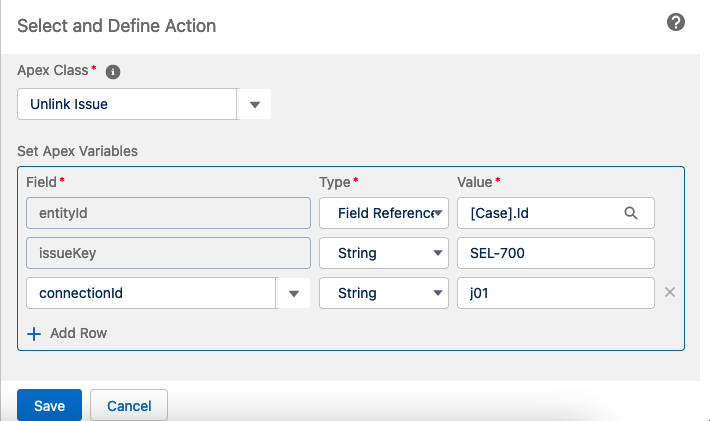
Errors during the Unlink operation are notified via email
Delete a Jira Issue
To Delete an Issue, call the following method with an Issue Key and an Entity ID:
zsfjira.ZC.Issues.deleteIssue('TP-1',Id.valueOf('5000H00000xLWAd'));Only Jira Issues created from the Salesforce entity specified in the method may be deleted.
For deleting issues of a different Jira, specify its connection as first parameter:
zsfjira.ZC.Issues.deleteIssue('j01','TP-1',Id.valueOf('5000H00000xLWAd'));Error Handling
The Delete operation will return an object containing the result of the operation.
zsfjira.ZCBeans.IssueDeleteResult result = zsfjira.ZC.Issues.deleteIssue('TP-1',Id.valueOf('5000H00000xLWAd'));
if(result.hasError()){
System.debug(System.LoggingLevel.ERROR,result.errorMessage);
}License Handling
The API requires a valid zAgileConnect license in order to execute. You may catch the exception if needed.
try{
zsfjira.ZCBeans.IssueLinkUnlinkResult result = zsfjira.ZC.Issues.deleteIssue('TP-1',Id.valueOf('5000H00000xLWAd'));
}catch(Exception exe){
...
}Posting Errors
You can post the errors to the parent entity (Case).
Id caseId = Id.valueOf('5000H00000zdi30');
zsfjira.ZCBeans.IssueLinkUnlinkResult result = zsfjira.ZC.Issues.deleteIssue('JP-1',caseId);
zsfjira.ZC.Issues.postErrorMessage(caseId,result);Bulk Operations
Create a set of strings holding the Issue Keys:
Set<String> issueKeys=new Set<String>();
issueKeys.add('TP-1');
issueKeys.add('TP-6');
issueKeys.add('TP-7');Use the method deleteIssues() with the above set and the Case ID:
List<zsfjira.ZCBeans.IssueDeleteResult> results = zsfjira.ZC.Issues.deleteIssues(issueKeys,Id.valueOf('5000H00000xLWAd'));
For deleting issues of a different Jira, specify its connection as first parameter:
List<zsfjira.ZCBeans.IssueDeleteResult> results = zsfjira.ZC.Issues.deleteIssues('j01', issueKeys,Id.valueOf('5000H00000xLWAd'));
Iterate the returned list in order to get the results of the Unlink operation:
for(zsfjira.ZCBeans.IssueDeleteResult result:results){
if(result.hasError()){
System.debug(System.LoggingLevel.ERROR,result.errorMessage);
}
}Delete Issues via Process Builder
Select the Apex class ‘Delete Issue’ and specify a Case ID and Issue Key.
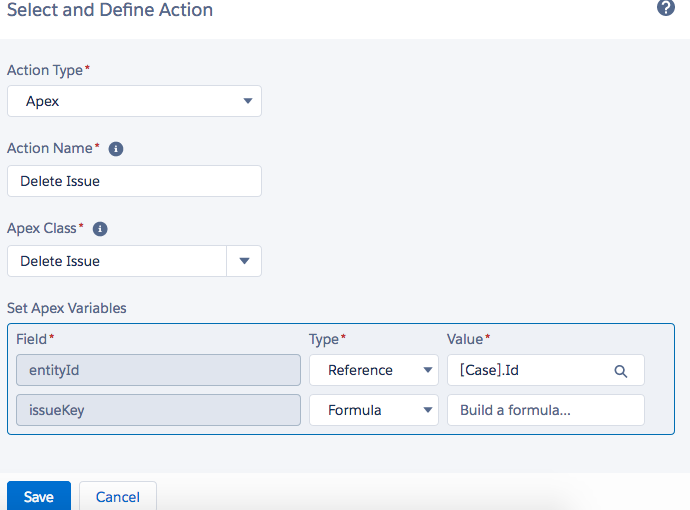
In the Apex action for deleting issues, you can specify the Jira Connection ID to delete an Issue of a Jira other than the 'Default':
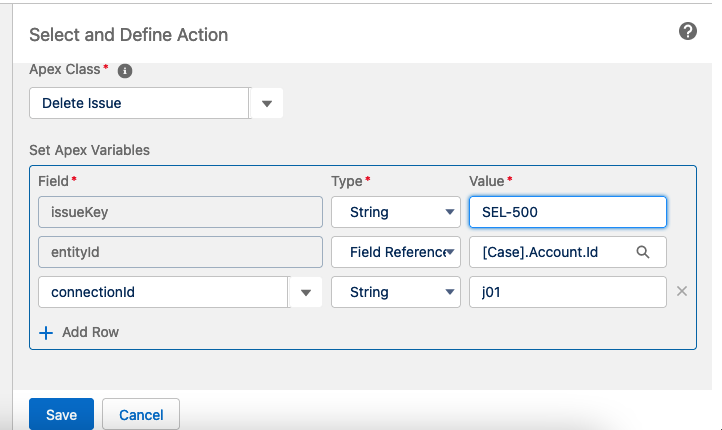
Errors during the Delete operation will be notified via email.
